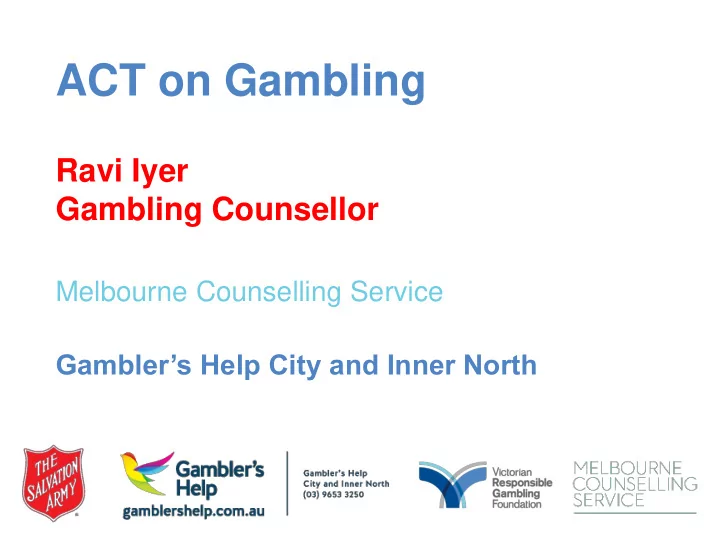

ACT on Gambling Ravi Iyer Gambling Counsellor Melbourne Counselling Service Gambler’s Help City and Inner North
1. ACT Model 2. Current state of research 3. Case Studies
1. The ACT Model
“ Based on modern behavioural psychology: ‘ relational frame theory ’ applies mindfulness and acceptance processes commitment & behaviour change processes ” creation of psychological flexibility Hayes, Luoma, Bond, Masuda and Lillis, 2006
ACT processes Relational Frame Theory Functional Contextualism
Functional Contextualism Context is everything Pragmatic truth Workability
Relational Frame Theory Metaphor Don’t Don’t struggle struggle Anxiety Quicksand Equivalent Psychological Physical Struggle Struggle Increasing arousal Increasing arousal
ACT Hexaflex
ACT processes Be Present Let Go Get Moving Present Moment Acceptance Values Away Psychological Flexibility Toward Committed Defusion Action Self as Context Dr Kevin Polk http://drkevinpolk.blogspot.com.au/p/matrix-and-hexaflex.html
2. State of the research
2. State of the research Comparatively new therapy in Gambling – 7 years Dixon, Nastally, Jackson & Habib, 2009: Near miss effect Addictions more generally – 10 years Heffner, Eifert, Parker, Hernandez & Sperry, 2003: Alcohol dependence Gifford et al ., 2004: Smoking cessation – 76 smokers Hayes et al ., 2004: polysubstance abusers – 138 ORT patients
Experiential Avoidance Marotta, 2002: Experiential avoidance as a functional process in gambling Rosenthal, 1994: Psychodynamic theory – defense against internal affects
Ruiz, 2010 Review of ACT evidence “ Deliberate efforts to avoid and escape from private events such as affects, thoughts memories and bodily sensations ” which are experienced as aversive Psychological inflexibility Weighted correlation r=0.55 Depression; r=0.52 Anxiety & EA Studies reviewed either equally efficacious or better than CBT
Maynard, Wilson, Labuzienski, & Whiting,, 2015 Systematic review & Meta-analysis: Mindfulness & Gambling • Individual studies not individually significant • When combined, yielded a significant pooled effect size Riley, 2014 Problematic Gambling 103 Gamblers Experiential Thought Suppression Mindfulness Avoidance
de Lisle, Dowling & Allen, 2011 Review of mindfulness & problem gambling Important for gamblers to incorporate a mindful practice into daily routines Gamblers come on board only after consequences outweigh benefits Important to identify mindfulness practices that suit the client Can be framed as a personal challenge Need to be used with caution, particularly with psychosis
de Lisle, Dowling & Allen, 2014 Study 1 = 78 gamblers Study 2 = 205 Gamblers Low mindfulness = high emotional dysregulation = psychological distress o Thought suppression common to gamblers o Problem gamblers have low levels of mindfulness o Mindfully attending to negative emotions may lead to gradual extinction of gambling
Dixon and colleagues, 2016 10 students (ACT) + 8 (untreated) ACT treated gamblers observed winning reals differently Following treatment, gamblers reported higher engagement In psychological flexibility and mindfulness behaviors Middle & prefrontal gyrus Amygdala Inferior parietal lobe Cuneus Precuneus Ventral Striatum PRE POST
3. Case Studies
ACT Triflex
Case studies: 60 YO female o Experienced teenage pregnancy o Black sheep of the family o Embezzled substantial amount over several years Psychological Flexibility OPEN Acceptance UP
Case study: 25 YO male o Lives for each pay o Dominated by self critical thoughts, perceived judgements o Future hope / past failures BE PRESENT Psychological Flexibility
Case study: 32 YO Male (Schizophrenia) o Positive symptoms well managed o Can discuss thoughts & feelings o Concern about developing a name for himself o Unsure of how to move forward Psychological Flexibility DO WHAT MATTERS Values
REFERENCES de Lisle, SM., Dowling, NA., & Allen, JS. (2011). Mindfulness and problem gambling: A review of the literature. Journal of Gambling Studies, DOI: 10.1007/s 10899-011-9284-7 de Lisle, S., Dowling, N., & Allen, S. (2014). Mechanisms of action in the relationship between mindfulness and problem gambling behaviour. International Journal of Mental Health Addiction, 12: 206-225. Dixon, MR, Nastally, BL, Jackson JE, Habib R. (2003). Altering the near-miss effect in slot machine gamblers. J Appl Behav Anal. 2009 Winter;42(4):913-8. doi: 10.1901/jaba.2009.42-913.
Dixon, MR., Wilson, AN., Habib, R. (2016) Neurological evidence of acceptance and commitment therapy effectiveness in college-age gamblers. Journal of Contextual Behavioral Science 5 (2016) 80 – 88 Gifford, EV., Kohlenberg, BS., Hayes, SC., Antonuccio, DO., Piasecki, MM., Rasmussen-Hall, ML., & Palm, KM. (2004). Acceptance-based treatment for smoking cessation. Behaviour Therapy, 35(4): 689-705 Heffner, M., Eifert, G. H., & Parker, B. T. (2003). Valued directions: Acceptance and commitment therapy in the treatment of alcohol dependence. Cognitive and Behavioral Practice, 1 (4), 378-383. Hayes, S.C., Luoma, J.B., Masuda, A., & Lillis, J. (2006). Acceptance and commitment Therapy: Model, processes and outcomes. Psychology Faculty Publications, Paper101
Hayes, S. C., Wilson, K. G., Gifford, E. V., Bissett, R., Piasecki, M., Batten, S. V., Byrd, M., & Gregg, J. (2004). A preliminary trial of Twelve-Step Facilitation and Acceptance and Commitment Therapy with polysubstance-abusing methadone- maintained opiate addicts. Behavior Therapy, 35 (4), 667-688. Marotta JJ (2002). Experiential avoidance as a functional process in gambling, in Marotta JJ, Cornelius JA, and Eadington WR. (Eds). The downside: Problem and pathological gambling, University of Nevada Press Maynard, B.R., Wilson, A.N., Labuzienski, E., & Whiting, S.W. (2015). Mindfulness-based approaches in the treatment of disordered gambling: A systematic review and meta-analysis. Research on social work practice, 1-15.
Rosenthal, RJ & Rugle, LJ. (1994). A psychodynamic approach to the treatment of pathological gambling: Part I. Achieving abstinence, Journal of Gambling Studies, 10(1): 21-42 Ruiz, FJ. (2010). A review of acceptance and commitment therapy (ACT) Empirical evidence: Correlational, experimental, psychopathological, component and outcome studies. International Journal of Psychology and psychological therapy, 10(1): 125-162. Riley, Ben (2014). Experiential avoidance mediates the association between thought suppression and mindfulness with problem gambling. Journal of Gambling Studies, 30: 163-171.
Recommend
More recommend